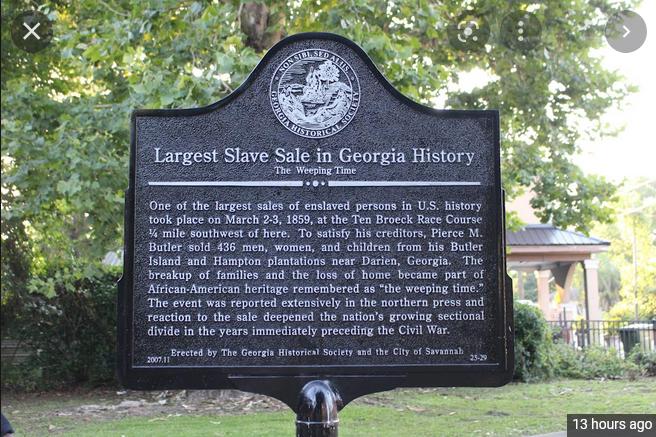Africa-Press – Gambia. Lucy, age 18. Kate, age unknown. Infant, age unknown…
One-by-one the names of the humans once enslaved at the Butler Plantation were read to commemorate the Weeping Time, the single largest recorded sale of enslaved people in U.S. history.
For Carmen Butler, one of 11 people who read all 436 names, this annual reckoning is personal.
“I didn’t have that connection until a few years ago,” she said during Saturday’s virtual ceremony. “And since that happened, my father, Leroy Butler, passed away. I felt a calling, a strong urge to be here in the land of my ancestors.”
Where to Go:Black History Month 2022: Here are 8 historic sites to visit in Savannah
Largest sale of humans in U.S. history
Carmen Butler’s ancestors were among those sold at the former Ten Broeck Race Course in west Savannah from March 2-3, 1859, so that plantation owner Pierce M. Butler could settle his gambling debts. African American families were separated, mothers from their children, husbands from their wives, and the palpable grief gave the Weeping Time its name. Carmen’s ancestors went to a plantation in Macon, then they settled in Philadelphia, Pennsylvania after emancipation.Butler owned more than 900 slaves across his Butler Island and Hamptom rice plantations 62 miles south of Savannah. More than 400 of his slaves were transported for the two-day auction, which garnered $303,850 — more than $10.2 million in today’s dollars.
“The Weeping time story touches so many people,” said Kiplyn Primus, a familiar voice to listeners of Atlanta’s WCLK 91.9’s The Local Take. “This was the largest sale of enslaved humans ever recorded in North America. And if we could figure out a way to do the math, I think the majority of families in our country will have been touched in some way or shape by this sale.”
Saturday’s ceremony focused on the history of The Weeping Time and featured keynote speaker Charmaine Minniefield, an artist and activist from Atlanta whose work “draws from indigenous traditions as seen throughout Africa and the Diaspora, to explore African and African-American history, memory, and ritual as an intentional push back against erasure.”
Minniefield spoke of her time in Gambia and the experiences that led her to work on the Praise House Project, a visual project that highlights the importance of the houses (typically small wooden structures) used by slaves for worship and as an act of resistance. Saturday’s ceremony focused on the history of The Weeping Time and featured keynote speaker Charmaine Minniefield, an artist and activist from Atlanta whose work “draws from indigenous traditions as seen throughout Africa and the Diaspora, to explore African and African-American history, memory, and ritual as an intentional push back against erasure.”
Minniefield spoke of her time in Gambia and the experiences that led her to work on the Praise House Project, a visual project that highlights the importance of the houses (typically small wooden structures) used by slaves for worship and as an act of resistance. As a result of such laws, Minniefield said praises houses allowed Black people to foster community, remember their African identity and culture in defiance of the laws and systems that erased, silenced, and dismantled Black communities.
“We stood in a circle, we sang in call and response, we moved counterclockwise in harmony, creating community, the way we did before we came to decide,” she said. Landscape architect and educator Kwesi DeGraft-Hanson, Ph.D., who facilitated the event, tied Minniefield’s comments back to local efforts to preserve a piece of property believed by the Weeping Time Coaltion to be historically significant to where the sale occurred and where the Salvation Army recently purchased land to build a shelter.
Commemorative events continue Sunday, beginning at 2 p.m. with a ceremony at Cyprian’s Episcopal Church, 401 Fort King George Drive in Darien. At 5 p.m., the Weeping Time Lighting Ceremony will be held at Butler Island Plantation, 7777 Butler Island Road.
For More News And Analysis About Gambia Follow Africa-Press






